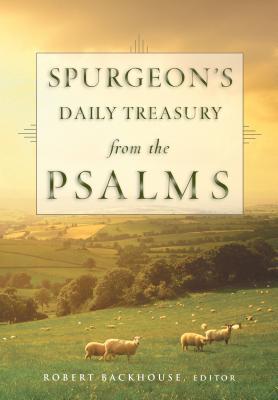- Bíblia
- Leia a Bíblia
- Versões da Bíblia
- Verso do dia
- Planos de Leitura
- Versos por Tópico
- Books of the Bible
- Imagens bíblicas
- Estude
- Comentários
- Concordâncias
- Dicionários
- Enciclopédias
- Sermões
- Bible Atlas & Maps
- BP Wiki
- Devocionais
- Devocionais de hoje
- Light of the World
- Todos os devocionais
- Inspirational Quotes
- Mais
- Picture Quotes
- Videos
- Inspirador
- Estudo da Bíblia
- O que a Bíblia diz
- Bible Q&As
- Daily Bread
- Bible by Genre
- Bible Stories
- Random Bible Verse
- Comunidade
- Store
Spurgeon's Daily Treasury from the Psalms
by C.H. Spurgeon
The Psalms express the full range of human emotions and needs like no other Bible book. From the discouragement and fear we encounter in this life to the longing and adoration of God, we so easily connect with these prayers and praises. It is easy to understand why the Psalms are the most read--and often most treasured--part of the Old Testament. Charles Spurgeon spent 20 years pondering the spiritual breadth and depth of the Psalms and compiling a seven-volume exposition. Now his comments are part of a devotional that breaks the 150 Psalms into 366 daily readings. Besides Spurgeon's words of wisdom, each devotional has a highlighted thought, suggested verses to meditate on, and Bible quotes in bold. The spiritual life of any believer will be enriched by these reflective writings from one of Christianity's beloved preachers.
BUY NOW
Hardcover
Published November 1st 2002 by Crossway Books
Se inscrever
© 2025 Bibleportal.com Todos os direitos reservados.

C.H. Spurgeon (1834 - 1892)
Spurgeon quickly became known as one of the most influential preachers of his time. Well known for his biblical powerful expositions of scripture and oratory ability. In modern evangelical circles he is stated to be the "Prince of Preachers." He pastored the Metropolitan Tabernacle in downtown London, England.His church was part of a particular baptist church movement and they defended and preached Christ and Him crucified and the purity of the Gospel message. Spurgeon never gave altar calls but always extended the invitation to come to Christ. He was a faithful minister in his time that glorified God and brought many to the living Christ.
Charles Haddon Spurgeon was England's best-known preacher for most of the second half of the nineteenth century. In 1854, just four years after his conversion, Spurgeon, then only 20, became pastor of London's famed New Park Street Church (formerly pastored by the famous Baptist theologian John Gill).
The congregation quickly outgrew their building, moved to Exeter Hall, then to Surrey Music Hall. In these venues Spurgeon frequently preached to audiences numbering more than 10,000 - all in the days before electronic amplification.
In 1861 the congregation moved permanently to the new Metropolitan Tabernacle.
... Show more